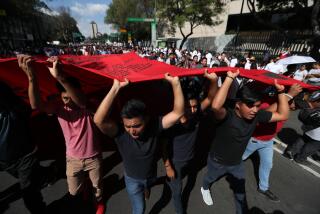Zapatistas Saying Farewell to Arms
- Share via
MEXICO CITY — Subcommander Marcos, in an interview published Saturday, said the Zapatistas are ready to give up their military character in favor of the political process.
“The movement has no future if its future is military,” Marcos told Nobel Prize-winning author Gabriel Garcia Marquez and Colombian editor Roberto Pombo of Cambio magazine. “If the [Zapatista National Liberation Army] remains as an armed military structure, it will fail. And the worst that could happen apart from that would be to gain power and install itself as a revolutionary army.”
Marcos described revolutionary military movements as ultimately unsuccessful in the sense that they typically become forms of oppression in a “dispute between hegemonies.” He sought to distance his movement from the national liberation movements of the 1960s and 1970s.
“The world, and specifically Mexican society, is made up of differences, and a relation must be built between these differences on a base of respect and tolerance, things which do not appear in the discourses of the politico-military organizations of the 1960s and 1970s,” he told Garcia Marquez, whose novel “100 Years of Solitude” he praised.
Marcos also slammed the failures of revolutionary movements of past decades for not standing up for the rights of indigenous peoples and other disenfranchised groups, including homosexuals.
His attempt to edge away from a military identity may be a practical one. His poorly equipped rebel forces have proved no match for the Mexican army in the few skirmishes fought since the Jan. 1, 1994, uprising and the brief taking of the small colonial city of San Cristobal de las Casas in southern Chiapas state.
He and fellow Zapatista leaders have been in the capital for two weeks after a 16-day caravan from their southern headquarters. Their stated aim is to lobby Congress for legislation granting Mexico’s 10 million indigenous people autonomy. Members of Congress have agreed to let the rebel leaders appear Wednesday before the lower house.
Mexican President Vicente Fox, who has sought a face-to-face meeting with Marcos, was not on the list of government officials invited to the session.
In the interview, Marcos loosed his usual string of hostile remarks against Fox, accusing him of wanting “a piece of the media pie” and of wanting to have his picture taken with rebel commanders. He said the rebels would rather meet with Fox’s peace negotiator, Luis H. Alvarez.
To understand Mexican “political theory,” Marcos also recommended readings of “Hamlet,” “Macbeth” and “Don Quixote.”
“There is no better way of understanding the Mexican political system in its tragic and comic parts,” Marcos said. “Better than any political analyst’s column.”
Marcos acknowledged personal details that have long been suspected: that he is the son of a middle-class, provincial family and that he is the movement’s military leader, not its “assistant commander,” as he has long depicted himself.
More to Read
Sign up for Essential California
The most important California stories and recommendations in your inbox every morning.
You may occasionally receive promotional content from the Los Angeles Times.













